University Law Assignment: Analysis of Agency and Insurance Law
VerifiedAdded on 2022/10/04
|11
|3050
|300
Report
AI Summary
This report analyzes a business law case involving agency and insurance law, focusing on the obligations of a law firm (LLA) towards a cruiser company (Glitz Cruisers). The report examines the relationship between a partner (Mike) and LLA, considering the principles of agency under the Partnership Act 1963 and common law. It explores the concept of actual and ostensible authority, highlighting how Mike's actions, even after leaving the firm, could bind LLA due to the appearance of continued authority. The analysis incorporates legal precedents like Freeman & Lockyer v Buckhurst Park Properties (Mangal) Ltd and considers the fulfillment of conditions for holding a company liable for an agent's actions. The report concludes that LLA has a financial obligation to Glitz Cruisers. Furthermore, the report also provides a brief overview of insurance regulation and the definition of insurance.
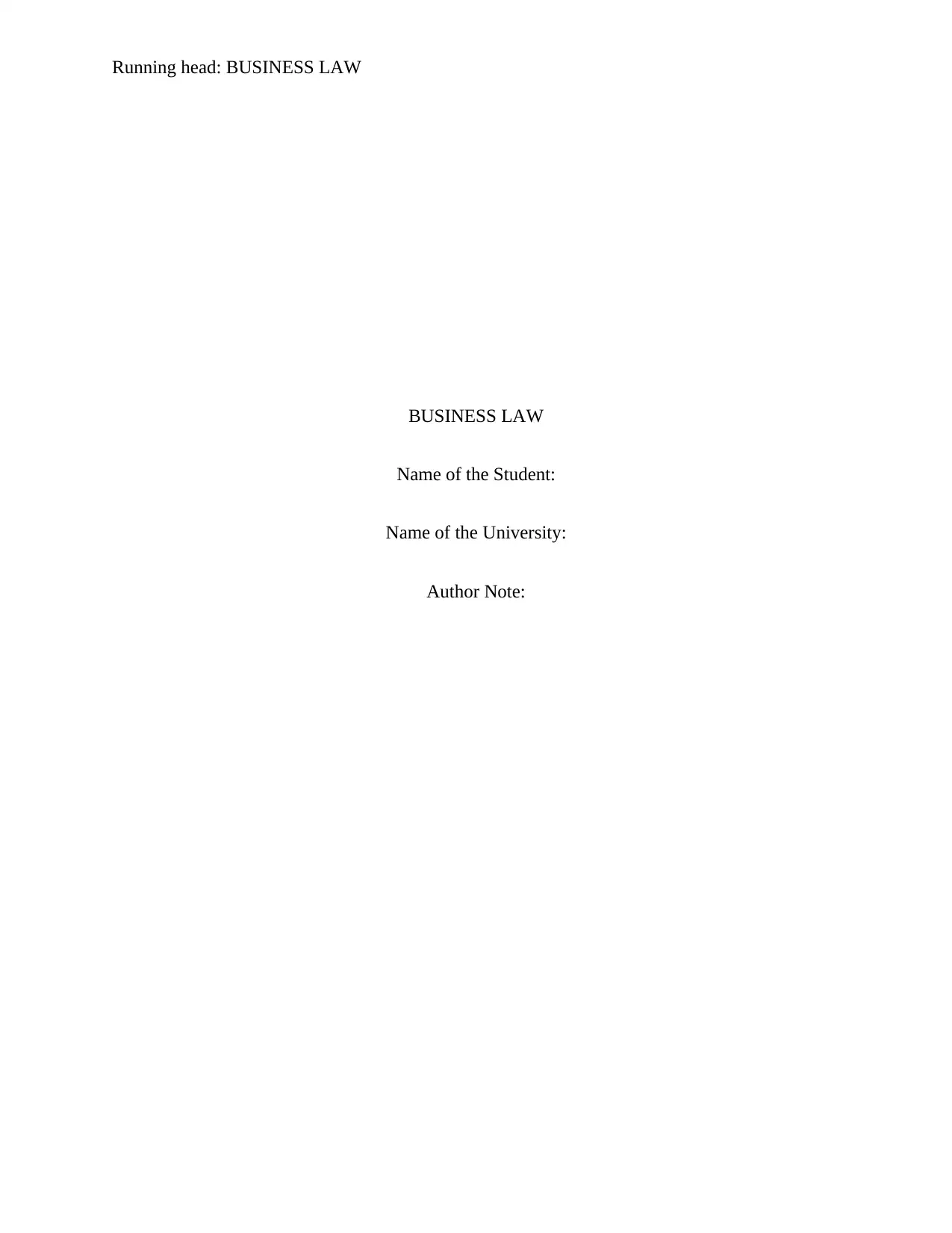
Running head: BUSINESS LAW
BUSINESS LAW
Name of the Student:
Name of the University:
Author Note:
BUSINESS LAW
Name of the Student:
Name of the University:
Author Note:
Paraphrase This Document
Need a fresh take? Get an instant paraphrase of this document with our AI Paraphraser
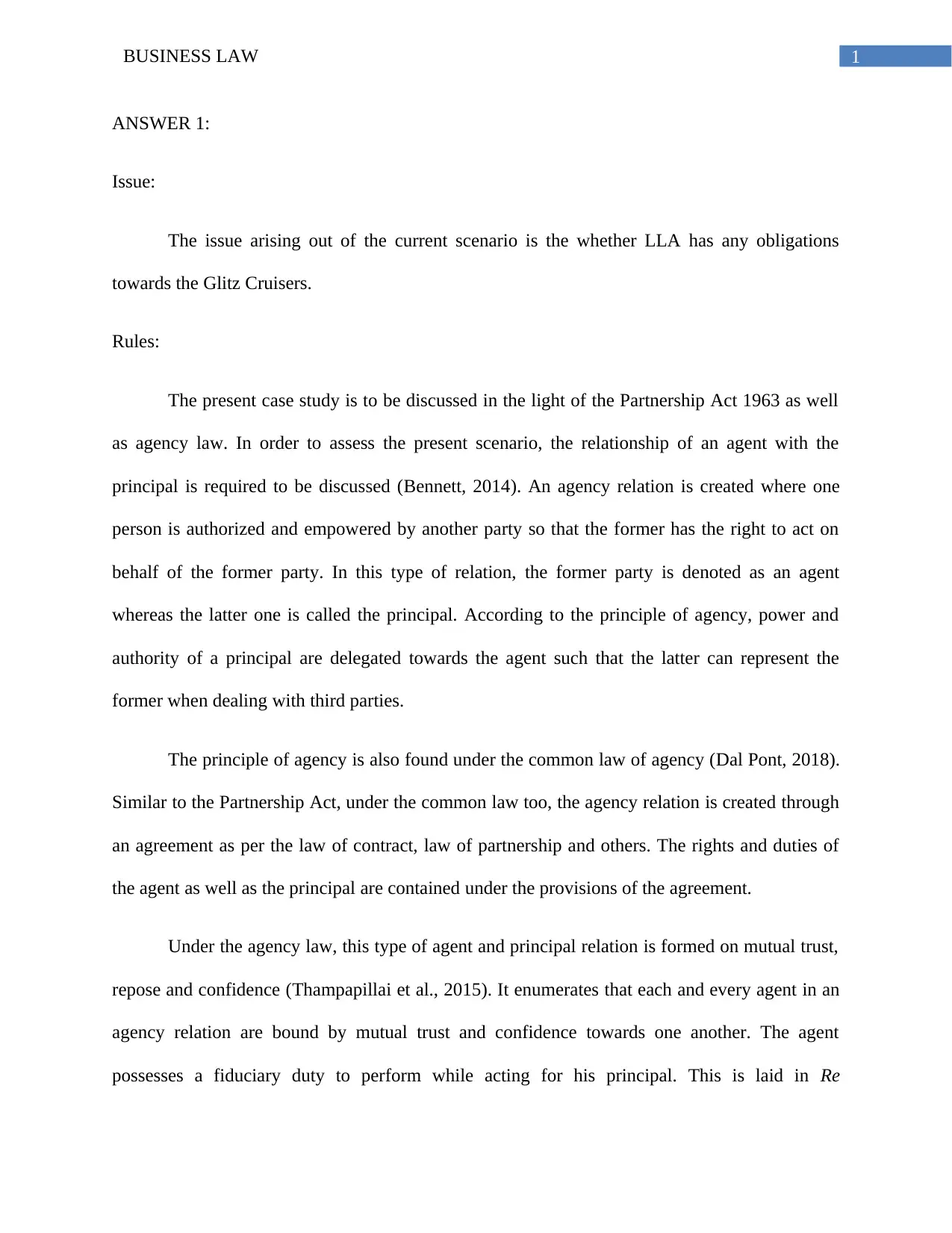
1BUSINESS LAW
ANSWER 1:
Issue:
The issue arising out of the current scenario is the whether LLA has any obligations
towards the Glitz Cruisers.
Rules:
The present case study is to be discussed in the light of the Partnership Act 1963 as well
as agency law. In order to assess the present scenario, the relationship of an agent with the
principal is required to be discussed (Bennett, 2014). An agency relation is created where one
person is authorized and empowered by another party so that the former has the right to act on
behalf of the former party. In this type of relation, the former party is denoted as an agent
whereas the latter one is called the principal. According to the principle of agency, power and
authority of a principal are delegated towards the agent such that the latter can represent the
former when dealing with third parties.
The principle of agency is also found under the common law of agency (Dal Pont, 2018).
Similar to the Partnership Act, under the common law too, the agency relation is created through
an agreement as per the law of contract, law of partnership and others. The rights and duties of
the agent as well as the principal are contained under the provisions of the agreement.
Under the agency law, this type of agent and principal relation is formed on mutual trust,
repose and confidence (Thampapillai et al., 2015). It enumerates that each and every agent in an
agency relation are bound by mutual trust and confidence towards one another. The agent
possesses a fiduciary duty to perform while acting for his principal. This is laid in Re
ANSWER 1:
Issue:
The issue arising out of the current scenario is the whether LLA has any obligations
towards the Glitz Cruisers.
Rules:
The present case study is to be discussed in the light of the Partnership Act 1963 as well
as agency law. In order to assess the present scenario, the relationship of an agent with the
principal is required to be discussed (Bennett, 2014). An agency relation is created where one
person is authorized and empowered by another party so that the former has the right to act on
behalf of the former party. In this type of relation, the former party is denoted as an agent
whereas the latter one is called the principal. According to the principle of agency, power and
authority of a principal are delegated towards the agent such that the latter can represent the
former when dealing with third parties.
The principle of agency is also found under the common law of agency (Dal Pont, 2018).
Similar to the Partnership Act, under the common law too, the agency relation is created through
an agreement as per the law of contract, law of partnership and others. The rights and duties of
the agent as well as the principal are contained under the provisions of the agreement.
Under the agency law, this type of agent and principal relation is formed on mutual trust,
repose and confidence (Thampapillai et al., 2015). It enumerates that each and every agent in an
agency relation are bound by mutual trust and confidence towards one another. The agent
possesses a fiduciary duty to perform while acting for his principal. This is laid in Re
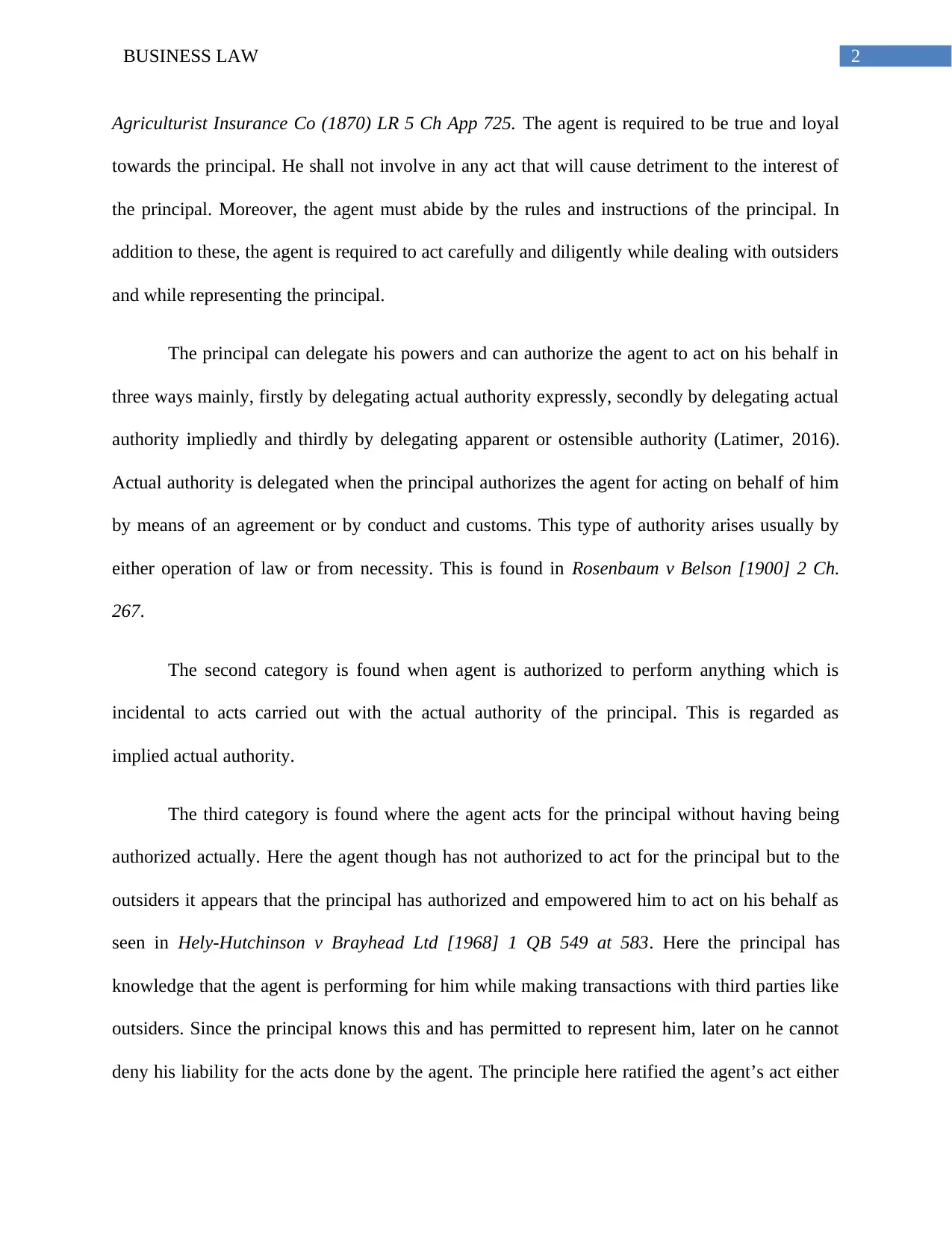
2BUSINESS LAW
Agriculturist Insurance Co (1870) LR 5 Ch App 725. The agent is required to be true and loyal
towards the principal. He shall not involve in any act that will cause detriment to the interest of
the principal. Moreover, the agent must abide by the rules and instructions of the principal. In
addition to these, the agent is required to act carefully and diligently while dealing with outsiders
and while representing the principal.
The principal can delegate his powers and can authorize the agent to act on his behalf in
three ways mainly, firstly by delegating actual authority expressly, secondly by delegating actual
authority impliedly and thirdly by delegating apparent or ostensible authority (Latimer, 2016).
Actual authority is delegated when the principal authorizes the agent for acting on behalf of him
by means of an agreement or by conduct and customs. This type of authority arises usually by
either operation of law or from necessity. This is found in Rosenbaum v Belson [1900] 2 Ch.
267.
The second category is found when agent is authorized to perform anything which is
incidental to acts carried out with the actual authority of the principal. This is regarded as
implied actual authority.
The third category is found where the agent acts for the principal without having being
authorized actually. Here the agent though has not authorized to act for the principal but to the
outsiders it appears that the principal has authorized and empowered him to act on his behalf as
seen in Hely-Hutchinson v Brayhead Ltd [1968] 1 QB 549 at 583. Here the principal has
knowledge that the agent is performing for him while making transactions with third parties like
outsiders. Since the principal knows this and has permitted to represent him, later on he cannot
deny his liability for the acts done by the agent. The principle here ratified the agent’s act either
Agriculturist Insurance Co (1870) LR 5 Ch App 725. The agent is required to be true and loyal
towards the principal. He shall not involve in any act that will cause detriment to the interest of
the principal. Moreover, the agent must abide by the rules and instructions of the principal. In
addition to these, the agent is required to act carefully and diligently while dealing with outsiders
and while representing the principal.
The principal can delegate his powers and can authorize the agent to act on his behalf in
three ways mainly, firstly by delegating actual authority expressly, secondly by delegating actual
authority impliedly and thirdly by delegating apparent or ostensible authority (Latimer, 2016).
Actual authority is delegated when the principal authorizes the agent for acting on behalf of him
by means of an agreement or by conduct and customs. This type of authority arises usually by
either operation of law or from necessity. This is found in Rosenbaum v Belson [1900] 2 Ch.
267.
The second category is found when agent is authorized to perform anything which is
incidental to acts carried out with the actual authority of the principal. This is regarded as
implied actual authority.
The third category is found where the agent acts for the principal without having being
authorized actually. Here the agent though has not authorized to act for the principal but to the
outsiders it appears that the principal has authorized and empowered him to act on his behalf as
seen in Hely-Hutchinson v Brayhead Ltd [1968] 1 QB 549 at 583. Here the principal has
knowledge that the agent is performing for him while making transactions with third parties like
outsiders. Since the principal knows this and has permitted to represent him, later on he cannot
deny his liability for the acts done by the agent. The principle here ratified the agent’s act either
⊘ This is a preview!⊘
Do you want full access?
Subscribe today to unlock all pages.

Trusted by 1+ million students worldwide
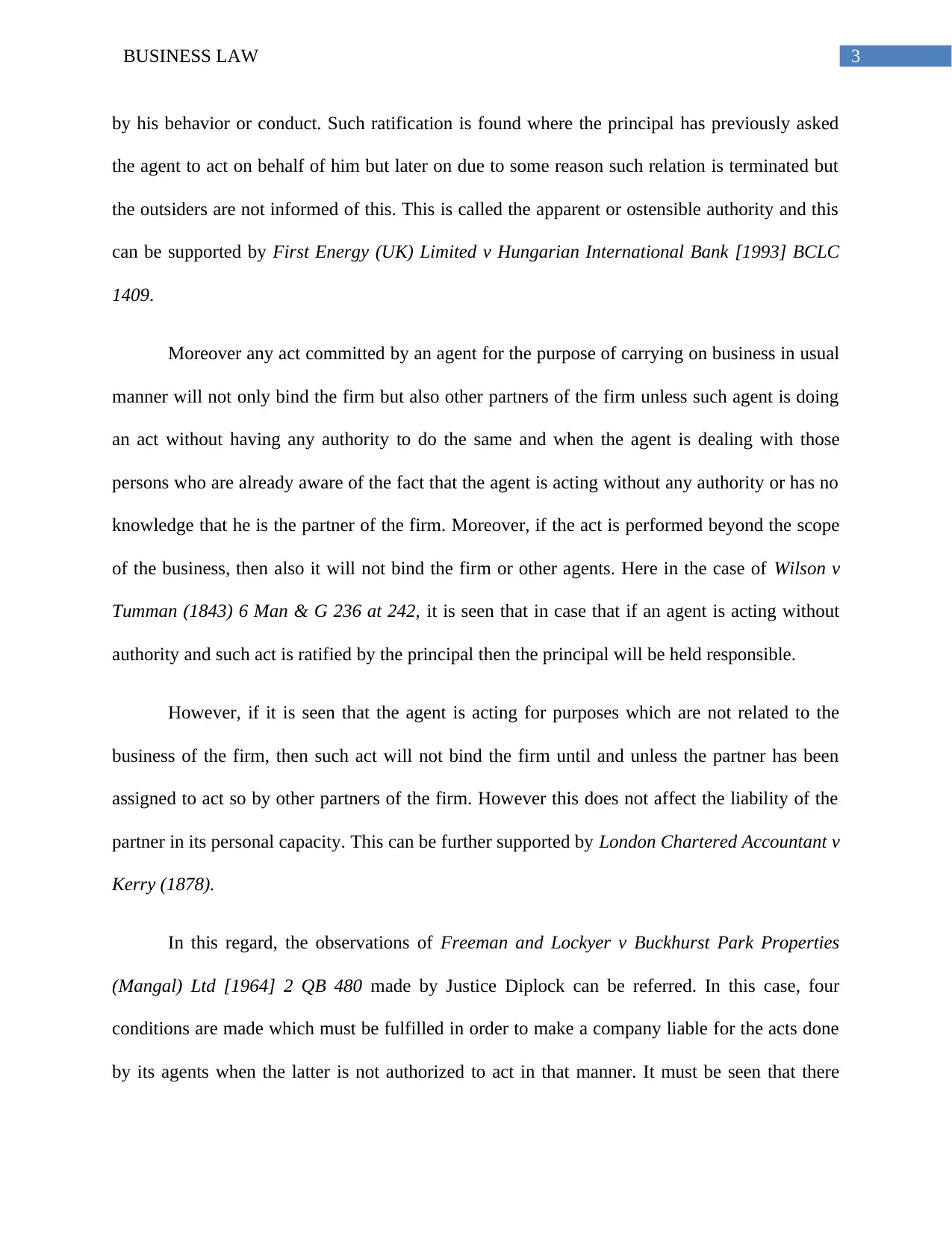
3BUSINESS LAW
by his behavior or conduct. Such ratification is found where the principal has previously asked
the agent to act on behalf of him but later on due to some reason such relation is terminated but
the outsiders are not informed of this. This is called the apparent or ostensible authority and this
can be supported by First Energy (UK) Limited v Hungarian International Bank [1993] BCLC
1409.
Moreover any act committed by an agent for the purpose of carrying on business in usual
manner will not only bind the firm but also other partners of the firm unless such agent is doing
an act without having any authority to do the same and when the agent is dealing with those
persons who are already aware of the fact that the agent is acting without any authority or has no
knowledge that he is the partner of the firm. Moreover, if the act is performed beyond the scope
of the business, then also it will not bind the firm or other agents. Here in the case of Wilson v
Tumman (1843) 6 Man & G 236 at 242, it is seen that in case that if an agent is acting without
authority and such act is ratified by the principal then the principal will be held responsible.
However, if it is seen that the agent is acting for purposes which are not related to the
business of the firm, then such act will not bind the firm until and unless the partner has been
assigned to act so by other partners of the firm. However this does not affect the liability of the
partner in its personal capacity. This can be further supported by London Chartered Accountant v
Kerry (1878).
In this regard, the observations of Freeman and Lockyer v Buckhurst Park Properties
(Mangal) Ltd [1964] 2 QB 480 made by Justice Diplock can be referred. In this case, four
conditions are made which must be fulfilled in order to make a company liable for the acts done
by its agents when the latter is not authorized to act in that manner. It must be seen that there
by his behavior or conduct. Such ratification is found where the principal has previously asked
the agent to act on behalf of him but later on due to some reason such relation is terminated but
the outsiders are not informed of this. This is called the apparent or ostensible authority and this
can be supported by First Energy (UK) Limited v Hungarian International Bank [1993] BCLC
1409.
Moreover any act committed by an agent for the purpose of carrying on business in usual
manner will not only bind the firm but also other partners of the firm unless such agent is doing
an act without having any authority to do the same and when the agent is dealing with those
persons who are already aware of the fact that the agent is acting without any authority or has no
knowledge that he is the partner of the firm. Moreover, if the act is performed beyond the scope
of the business, then also it will not bind the firm or other agents. Here in the case of Wilson v
Tumman (1843) 6 Man & G 236 at 242, it is seen that in case that if an agent is acting without
authority and such act is ratified by the principal then the principal will be held responsible.
However, if it is seen that the agent is acting for purposes which are not related to the
business of the firm, then such act will not bind the firm until and unless the partner has been
assigned to act so by other partners of the firm. However this does not affect the liability of the
partner in its personal capacity. This can be further supported by London Chartered Accountant v
Kerry (1878).
In this regard, the observations of Freeman and Lockyer v Buckhurst Park Properties
(Mangal) Ltd [1964] 2 QB 480 made by Justice Diplock can be referred. In this case, four
conditions are made which must be fulfilled in order to make a company liable for the acts done
by its agents when the latter is not authorized to act in that manner. It must be seen that there
Paraphrase This Document
Need a fresh take? Get an instant paraphrase of this document with our AI Paraphraser
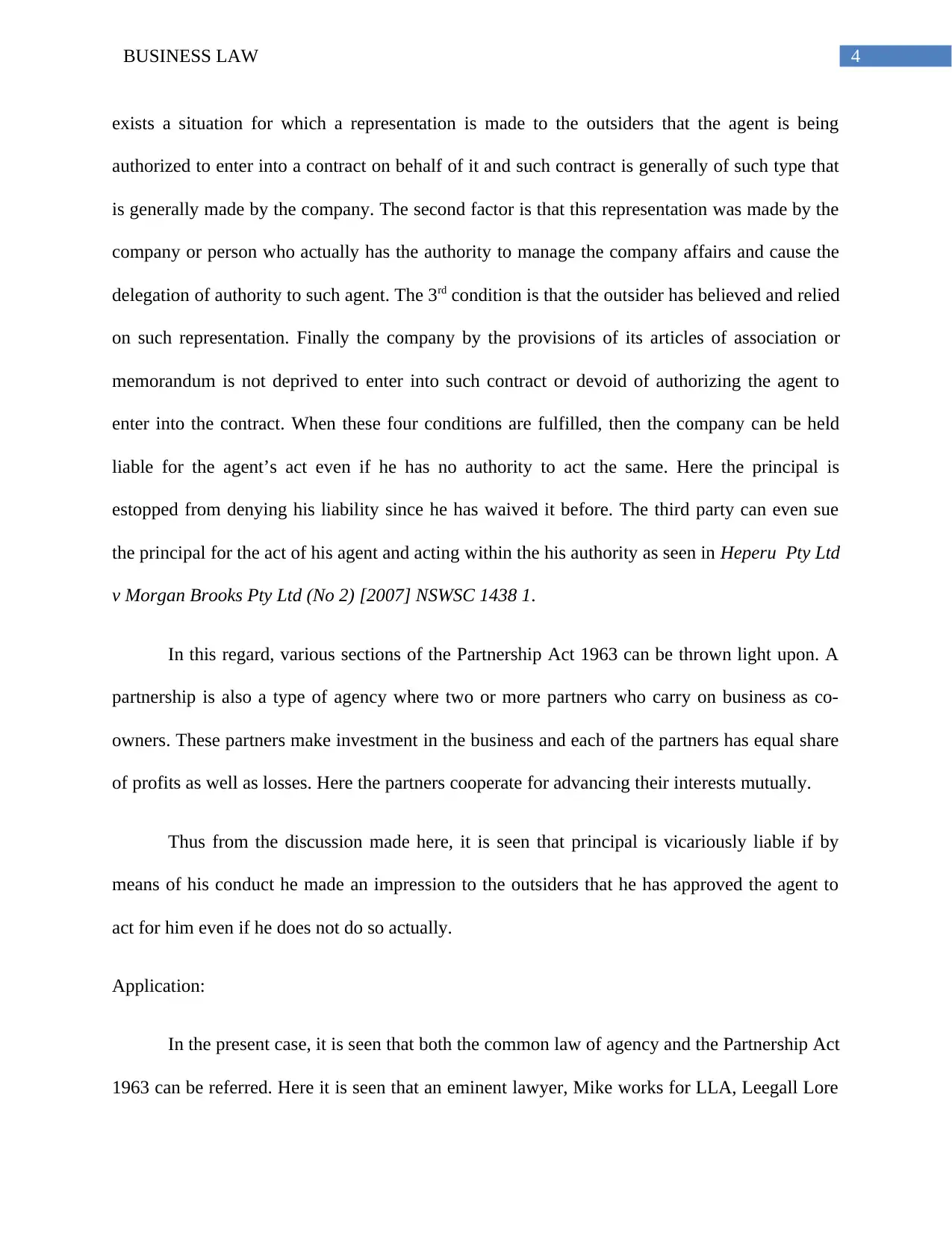
4BUSINESS LAW
exists a situation for which a representation is made to the outsiders that the agent is being
authorized to enter into a contract on behalf of it and such contract is generally of such type that
is generally made by the company. The second factor is that this representation was made by the
company or person who actually has the authority to manage the company affairs and cause the
delegation of authority to such agent. The 3rd condition is that the outsider has believed and relied
on such representation. Finally the company by the provisions of its articles of association or
memorandum is not deprived to enter into such contract or devoid of authorizing the agent to
enter into the contract. When these four conditions are fulfilled, then the company can be held
liable for the agent’s act even if he has no authority to act the same. Here the principal is
estopped from denying his liability since he has waived it before. The third party can even sue
the principal for the act of his agent and acting within the his authority as seen in Heperu Pty Ltd
v Morgan Brooks Pty Ltd (No 2) [2007] NSWSC 1438 1.
In this regard, various sections of the Partnership Act 1963 can be thrown light upon. A
partnership is also a type of agency where two or more partners who carry on business as co-
owners. These partners make investment in the business and each of the partners has equal share
of profits as well as losses. Here the partners cooperate for advancing their interests mutually.
Thus from the discussion made here, it is seen that principal is vicariously liable if by
means of his conduct he made an impression to the outsiders that he has approved the agent to
act for him even if he does not do so actually.
Application:
In the present case, it is seen that both the common law of agency and the Partnership Act
1963 can be referred. Here it is seen that an eminent lawyer, Mike works for LLA, Leegall Lore
exists a situation for which a representation is made to the outsiders that the agent is being
authorized to enter into a contract on behalf of it and such contract is generally of such type that
is generally made by the company. The second factor is that this representation was made by the
company or person who actually has the authority to manage the company affairs and cause the
delegation of authority to such agent. The 3rd condition is that the outsider has believed and relied
on such representation. Finally the company by the provisions of its articles of association or
memorandum is not deprived to enter into such contract or devoid of authorizing the agent to
enter into the contract. When these four conditions are fulfilled, then the company can be held
liable for the agent’s act even if he has no authority to act the same. Here the principal is
estopped from denying his liability since he has waived it before. The third party can even sue
the principal for the act of his agent and acting within the his authority as seen in Heperu Pty Ltd
v Morgan Brooks Pty Ltd (No 2) [2007] NSWSC 1438 1.
In this regard, various sections of the Partnership Act 1963 can be thrown light upon. A
partnership is also a type of agency where two or more partners who carry on business as co-
owners. These partners make investment in the business and each of the partners has equal share
of profits as well as losses. Here the partners cooperate for advancing their interests mutually.
Thus from the discussion made here, it is seen that principal is vicariously liable if by
means of his conduct he made an impression to the outsiders that he has approved the agent to
act for him even if he does not do so actually.
Application:
In the present case, it is seen that both the common law of agency and the Partnership Act
1963 can be referred. Here it is seen that an eminent lawyer, Mike works for LLA, Leegall Lore
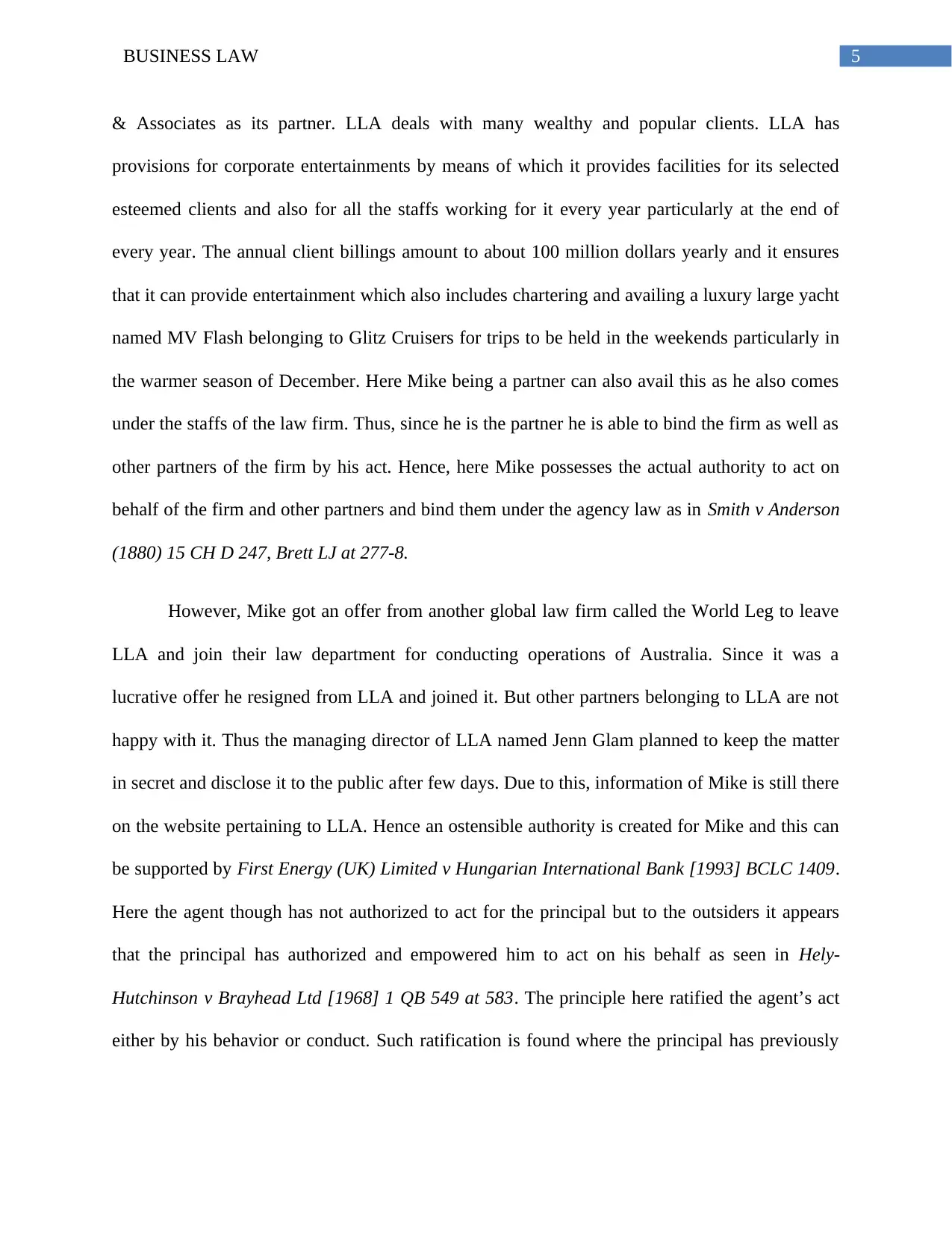
5BUSINESS LAW
& Associates as its partner. LLA deals with many wealthy and popular clients. LLA has
provisions for corporate entertainments by means of which it provides facilities for its selected
esteemed clients and also for all the staffs working for it every year particularly at the end of
every year. The annual client billings amount to about 100 million dollars yearly and it ensures
that it can provide entertainment which also includes chartering and availing a luxury large yacht
named MV Flash belonging to Glitz Cruisers for trips to be held in the weekends particularly in
the warmer season of December. Here Mike being a partner can also avail this as he also comes
under the staffs of the law firm. Thus, since he is the partner he is able to bind the firm as well as
other partners of the firm by his act. Hence, here Mike possesses the actual authority to act on
behalf of the firm and other partners and bind them under the agency law as in Smith v Anderson
(1880) 15 CH D 247, Brett LJ at 277-8.
However, Mike got an offer from another global law firm called the World Leg to leave
LLA and join their law department for conducting operations of Australia. Since it was a
lucrative offer he resigned from LLA and joined it. But other partners belonging to LLA are not
happy with it. Thus the managing director of LLA named Jenn Glam planned to keep the matter
in secret and disclose it to the public after few days. Due to this, information of Mike is still there
on the website pertaining to LLA. Hence an ostensible authority is created for Mike and this can
be supported by First Energy (UK) Limited v Hungarian International Bank [1993] BCLC 1409.
Here the agent though has not authorized to act for the principal but to the outsiders it appears
that the principal has authorized and empowered him to act on his behalf as seen in Hely-
Hutchinson v Brayhead Ltd [1968] 1 QB 549 at 583. The principle here ratified the agent’s act
either by his behavior or conduct. Such ratification is found where the principal has previously
& Associates as its partner. LLA deals with many wealthy and popular clients. LLA has
provisions for corporate entertainments by means of which it provides facilities for its selected
esteemed clients and also for all the staffs working for it every year particularly at the end of
every year. The annual client billings amount to about 100 million dollars yearly and it ensures
that it can provide entertainment which also includes chartering and availing a luxury large yacht
named MV Flash belonging to Glitz Cruisers for trips to be held in the weekends particularly in
the warmer season of December. Here Mike being a partner can also avail this as he also comes
under the staffs of the law firm. Thus, since he is the partner he is able to bind the firm as well as
other partners of the firm by his act. Hence, here Mike possesses the actual authority to act on
behalf of the firm and other partners and bind them under the agency law as in Smith v Anderson
(1880) 15 CH D 247, Brett LJ at 277-8.
However, Mike got an offer from another global law firm called the World Leg to leave
LLA and join their law department for conducting operations of Australia. Since it was a
lucrative offer he resigned from LLA and joined it. But other partners belonging to LLA are not
happy with it. Thus the managing director of LLA named Jenn Glam planned to keep the matter
in secret and disclose it to the public after few days. Due to this, information of Mike is still there
on the website pertaining to LLA. Hence an ostensible authority is created for Mike and this can
be supported by First Energy (UK) Limited v Hungarian International Bank [1993] BCLC 1409.
Here the agent though has not authorized to act for the principal but to the outsiders it appears
that the principal has authorized and empowered him to act on his behalf as seen in Hely-
Hutchinson v Brayhead Ltd [1968] 1 QB 549 at 583. The principle here ratified the agent’s act
either by his behavior or conduct. Such ratification is found where the principal has previously
⊘ This is a preview!⊘
Do you want full access?
Subscribe today to unlock all pages.

Trusted by 1+ million students worldwide
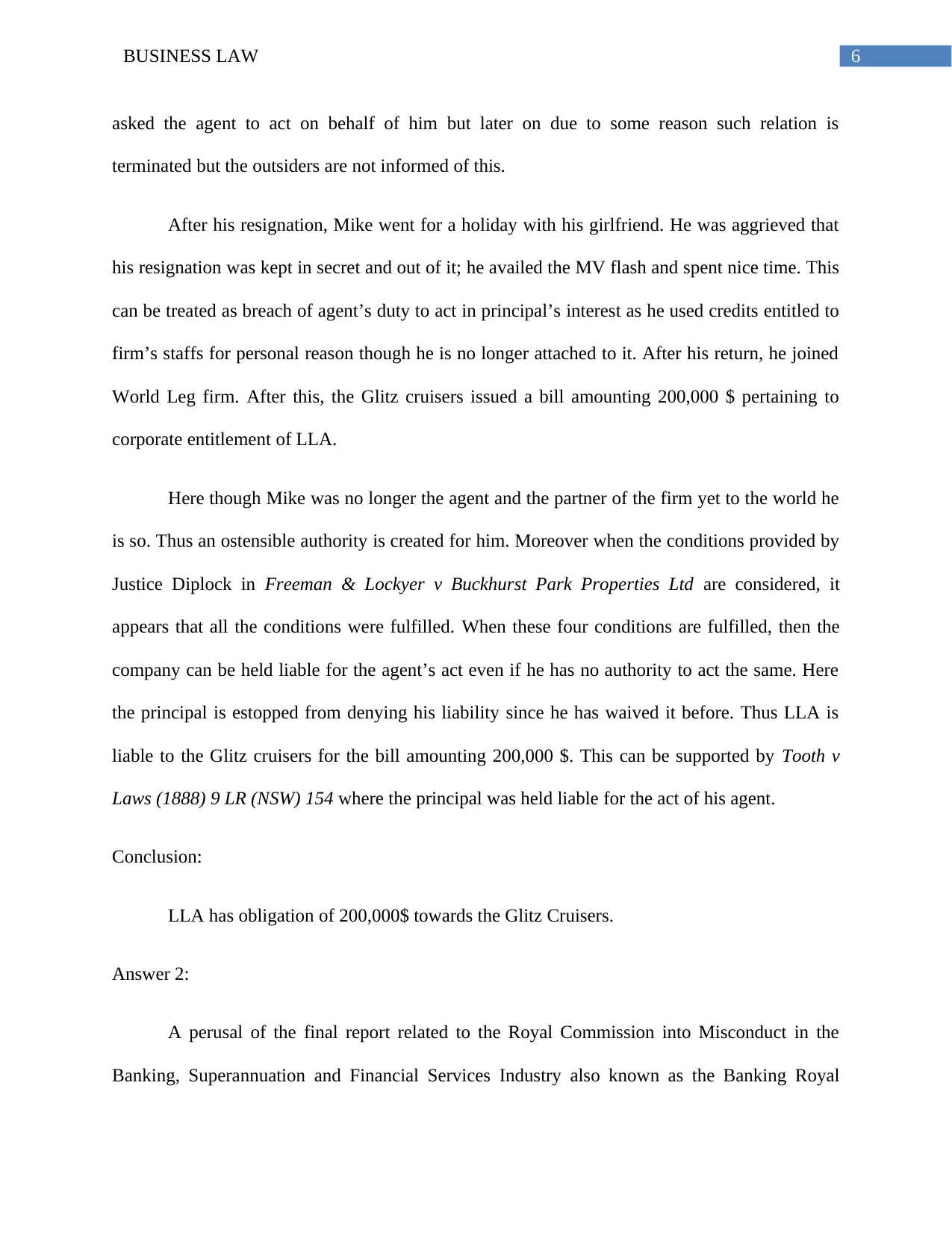
6BUSINESS LAW
asked the agent to act on behalf of him but later on due to some reason such relation is
terminated but the outsiders are not informed of this.
After his resignation, Mike went for a holiday with his girlfriend. He was aggrieved that
his resignation was kept in secret and out of it; he availed the MV flash and spent nice time. This
can be treated as breach of agent’s duty to act in principal’s interest as he used credits entitled to
firm’s staffs for personal reason though he is no longer attached to it. After his return, he joined
World Leg firm. After this, the Glitz cruisers issued a bill amounting 200,000 $ pertaining to
corporate entitlement of LLA.
Here though Mike was no longer the agent and the partner of the firm yet to the world he
is so. Thus an ostensible authority is created for him. Moreover when the conditions provided by
Justice Diplock in Freeman & Lockyer v Buckhurst Park Properties Ltd are considered, it
appears that all the conditions were fulfilled. When these four conditions are fulfilled, then the
company can be held liable for the agent’s act even if he has no authority to act the same. Here
the principal is estopped from denying his liability since he has waived it before. Thus LLA is
liable to the Glitz cruisers for the bill amounting 200,000 $. This can be supported by Tooth v
Laws (1888) 9 LR (NSW) 154 where the principal was held liable for the act of his agent.
Conclusion:
LLA has obligation of 200,000$ towards the Glitz Cruisers.
Answer 2:
A perusal of the final report related to the Royal Commission into Misconduct in the
Banking, Superannuation and Financial Services Industry also known as the Banking Royal
asked the agent to act on behalf of him but later on due to some reason such relation is
terminated but the outsiders are not informed of this.
After his resignation, Mike went for a holiday with his girlfriend. He was aggrieved that
his resignation was kept in secret and out of it; he availed the MV flash and spent nice time. This
can be treated as breach of agent’s duty to act in principal’s interest as he used credits entitled to
firm’s staffs for personal reason though he is no longer attached to it. After his return, he joined
World Leg firm. After this, the Glitz cruisers issued a bill amounting 200,000 $ pertaining to
corporate entitlement of LLA.
Here though Mike was no longer the agent and the partner of the firm yet to the world he
is so. Thus an ostensible authority is created for him. Moreover when the conditions provided by
Justice Diplock in Freeman & Lockyer v Buckhurst Park Properties Ltd are considered, it
appears that all the conditions were fulfilled. When these four conditions are fulfilled, then the
company can be held liable for the agent’s act even if he has no authority to act the same. Here
the principal is estopped from denying his liability since he has waived it before. Thus LLA is
liable to the Glitz cruisers for the bill amounting 200,000 $. This can be supported by Tooth v
Laws (1888) 9 LR (NSW) 154 where the principal was held liable for the act of his agent.
Conclusion:
LLA has obligation of 200,000$ towards the Glitz Cruisers.
Answer 2:
A perusal of the final report related to the Royal Commission into Misconduct in the
Banking, Superannuation and Financial Services Industry also known as the Banking Royal
Paraphrase This Document
Need a fresh take? Get an instant paraphrase of this document with our AI Paraphraser
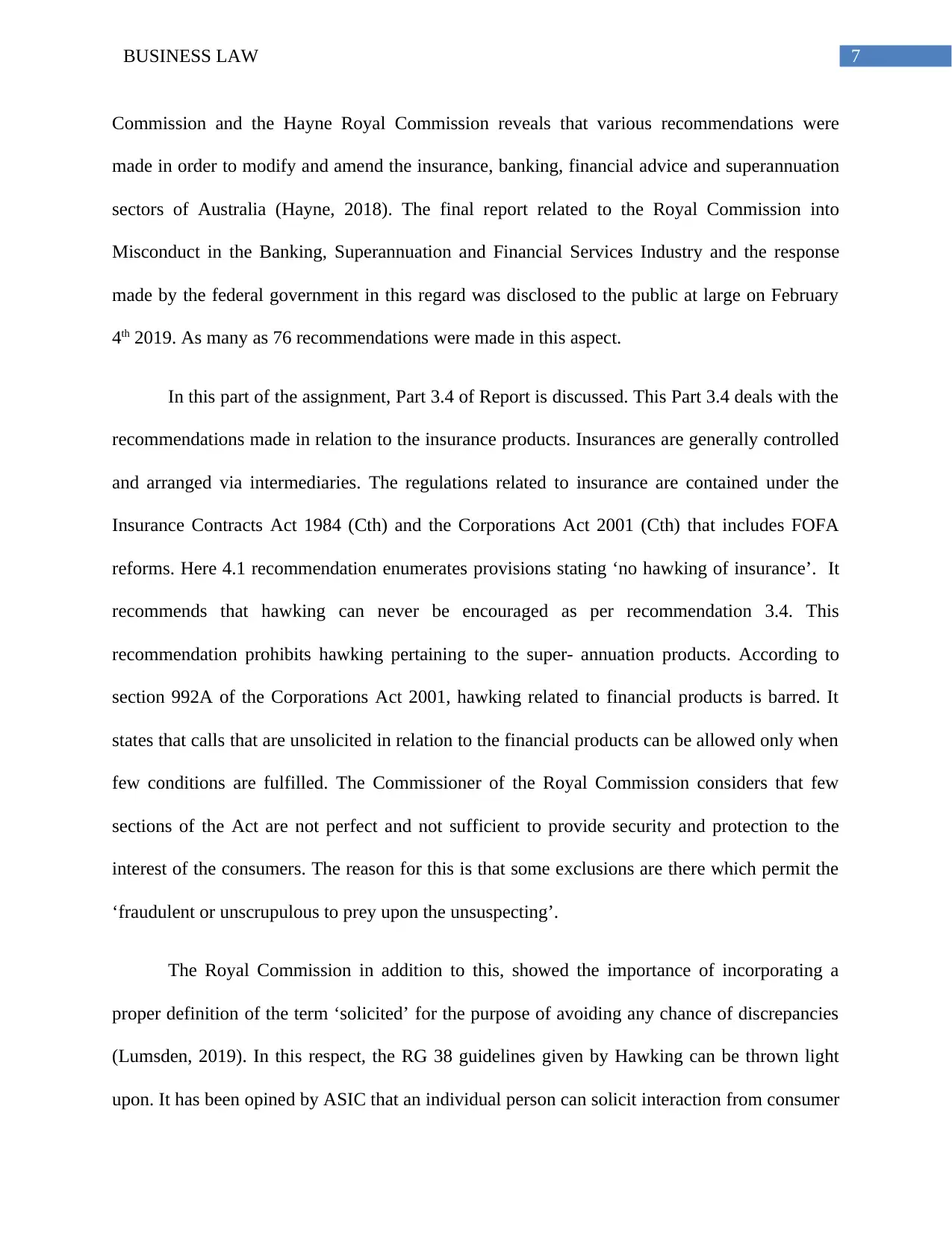
7BUSINESS LAW
Commission and the Hayne Royal Commission reveals that various recommendations were
made in order to modify and amend the insurance, banking, financial advice and superannuation
sectors of Australia (Hayne, 2018). The final report related to the Royal Commission into
Misconduct in the Banking, Superannuation and Financial Services Industry and the response
made by the federal government in this regard was disclosed to the public at large on February
4th 2019. As many as 76 recommendations were made in this aspect.
In this part of the assignment, Part 3.4 of Report is discussed. This Part 3.4 deals with the
recommendations made in relation to the insurance products. Insurances are generally controlled
and arranged via intermediaries. The regulations related to insurance are contained under the
Insurance Contracts Act 1984 (Cth) and the Corporations Act 2001 (Cth) that includes FOFA
reforms. Here 4.1 recommendation enumerates provisions stating ‘no hawking of insurance’. It
recommends that hawking can never be encouraged as per recommendation 3.4. This
recommendation prohibits hawking pertaining to the super- annuation products. According to
section 992A of the Corporations Act 2001, hawking related to financial products is barred. It
states that calls that are unsolicited in relation to the financial products can be allowed only when
few conditions are fulfilled. The Commissioner of the Royal Commission considers that few
sections of the Act are not perfect and not sufficient to provide security and protection to the
interest of the consumers. The reason for this is that some exclusions are there which permit the
‘fraudulent or unscrupulous to prey upon the unsuspecting’.
The Royal Commission in addition to this, showed the importance of incorporating a
proper definition of the term ‘solicited’ for the purpose of avoiding any chance of discrepancies
(Lumsden, 2019). In this respect, the RG 38 guidelines given by Hawking can be thrown light
upon. It has been opined by ASIC that an individual person can solicit interaction from consumer
Commission and the Hayne Royal Commission reveals that various recommendations were
made in order to modify and amend the insurance, banking, financial advice and superannuation
sectors of Australia (Hayne, 2018). The final report related to the Royal Commission into
Misconduct in the Banking, Superannuation and Financial Services Industry and the response
made by the federal government in this regard was disclosed to the public at large on February
4th 2019. As many as 76 recommendations were made in this aspect.
In this part of the assignment, Part 3.4 of Report is discussed. This Part 3.4 deals with the
recommendations made in relation to the insurance products. Insurances are generally controlled
and arranged via intermediaries. The regulations related to insurance are contained under the
Insurance Contracts Act 1984 (Cth) and the Corporations Act 2001 (Cth) that includes FOFA
reforms. Here 4.1 recommendation enumerates provisions stating ‘no hawking of insurance’. It
recommends that hawking can never be encouraged as per recommendation 3.4. This
recommendation prohibits hawking pertaining to the super- annuation products. According to
section 992A of the Corporations Act 2001, hawking related to financial products is barred. It
states that calls that are unsolicited in relation to the financial products can be allowed only when
few conditions are fulfilled. The Commissioner of the Royal Commission considers that few
sections of the Act are not perfect and not sufficient to provide security and protection to the
interest of the consumers. The reason for this is that some exclusions are there which permit the
‘fraudulent or unscrupulous to prey upon the unsuspecting’.
The Royal Commission in addition to this, showed the importance of incorporating a
proper definition of the term ‘solicited’ for the purpose of avoiding any chance of discrepancies
(Lumsden, 2019). In this respect, the RG 38 guidelines given by Hawking can be thrown light
upon. It has been opined by ASIC that an individual person can solicit interaction from consumer
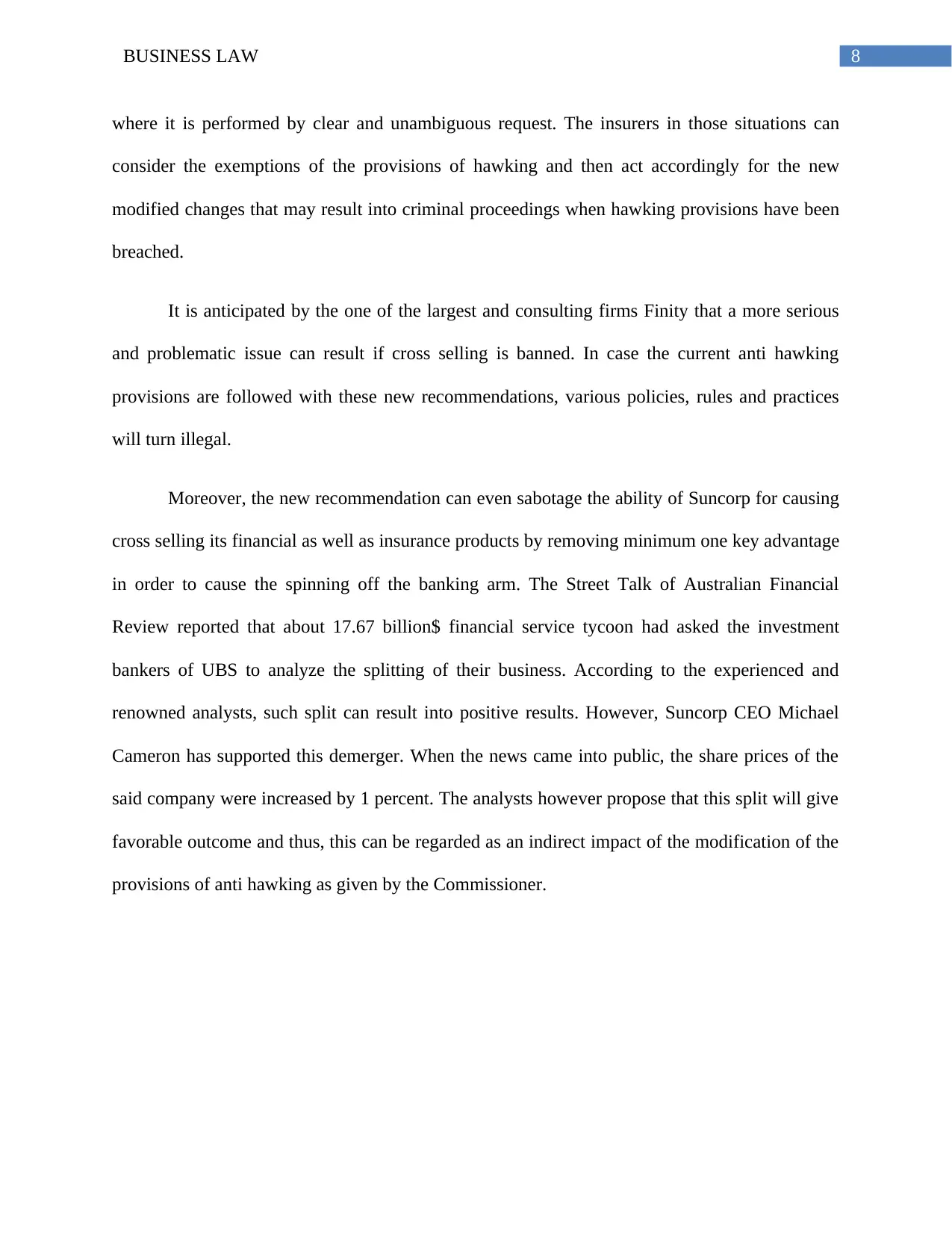
8BUSINESS LAW
where it is performed by clear and unambiguous request. The insurers in those situations can
consider the exemptions of the provisions of hawking and then act accordingly for the new
modified changes that may result into criminal proceedings when hawking provisions have been
breached.
It is anticipated by the one of the largest and consulting firms Finity that a more serious
and problematic issue can result if cross selling is banned. In case the current anti hawking
provisions are followed with these new recommendations, various policies, rules and practices
will turn illegal.
Moreover, the new recommendation can even sabotage the ability of Suncorp for causing
cross selling its financial as well as insurance products by removing minimum one key advantage
in order to cause the spinning off the banking arm. The Street Talk of Australian Financial
Review reported that about 17.67 billion$ financial service tycoon had asked the investment
bankers of UBS to analyze the splitting of their business. According to the experienced and
renowned analysts, such split can result into positive results. However, Suncorp CEO Michael
Cameron has supported this demerger. When the news came into public, the share prices of the
said company were increased by 1 percent. The analysts however propose that this split will give
favorable outcome and thus, this can be regarded as an indirect impact of the modification of the
provisions of anti hawking as given by the Commissioner.
where it is performed by clear and unambiguous request. The insurers in those situations can
consider the exemptions of the provisions of hawking and then act accordingly for the new
modified changes that may result into criminal proceedings when hawking provisions have been
breached.
It is anticipated by the one of the largest and consulting firms Finity that a more serious
and problematic issue can result if cross selling is banned. In case the current anti hawking
provisions are followed with these new recommendations, various policies, rules and practices
will turn illegal.
Moreover, the new recommendation can even sabotage the ability of Suncorp for causing
cross selling its financial as well as insurance products by removing minimum one key advantage
in order to cause the spinning off the banking arm. The Street Talk of Australian Financial
Review reported that about 17.67 billion$ financial service tycoon had asked the investment
bankers of UBS to analyze the splitting of their business. According to the experienced and
renowned analysts, such split can result into positive results. However, Suncorp CEO Michael
Cameron has supported this demerger. When the news came into public, the share prices of the
said company were increased by 1 percent. The analysts however propose that this split will give
favorable outcome and thus, this can be regarded as an indirect impact of the modification of the
provisions of anti hawking as given by the Commissioner.
⊘ This is a preview!⊘
Do you want full access?
Subscribe today to unlock all pages.

Trusted by 1+ million students worldwide
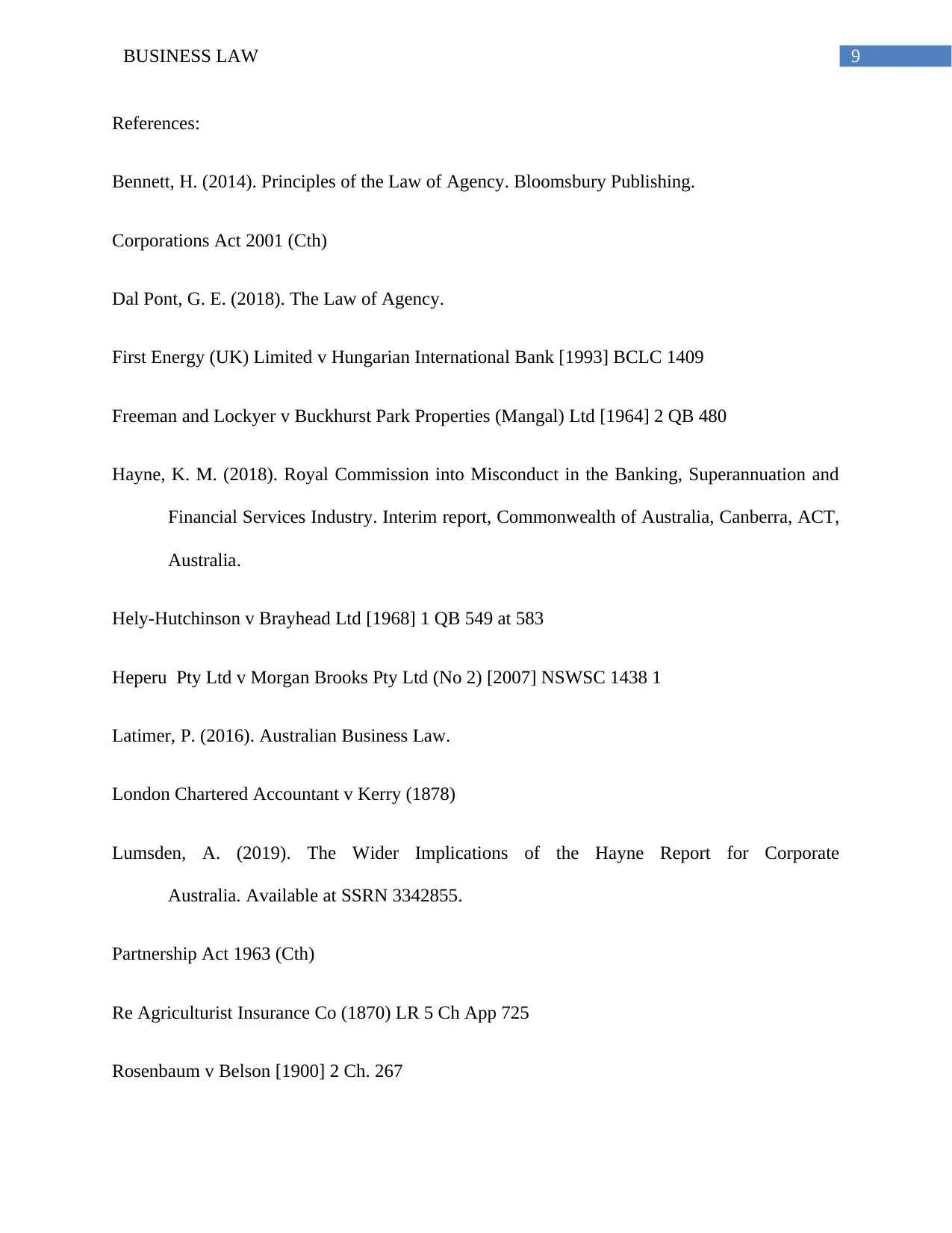
9BUSINESS LAW
References:
Bennett, H. (2014). Principles of the Law of Agency. Bloomsbury Publishing.
Corporations Act 2001 (Cth)
Dal Pont, G. E. (2018). The Law of Agency.
First Energy (UK) Limited v Hungarian International Bank [1993] BCLC 1409
Freeman and Lockyer v Buckhurst Park Properties (Mangal) Ltd [1964] 2 QB 480
Hayne, K. M. (2018). Royal Commission into Misconduct in the Banking, Superannuation and
Financial Services Industry. Interim report, Commonwealth of Australia, Canberra, ACT,
Australia.
Hely-Hutchinson v Brayhead Ltd [1968] 1 QB 549 at 583
Heperu Pty Ltd v Morgan Brooks Pty Ltd (No 2) [2007] NSWSC 1438 1
Latimer, P. (2016). Australian Business Law.
London Chartered Accountant v Kerry (1878)
Lumsden, A. (2019). The Wider Implications of the Hayne Report for Corporate
Australia. Available at SSRN 3342855.
Partnership Act 1963 (Cth)
Re Agriculturist Insurance Co (1870) LR 5 Ch App 725
Rosenbaum v Belson [1900] 2 Ch. 267
References:
Bennett, H. (2014). Principles of the Law of Agency. Bloomsbury Publishing.
Corporations Act 2001 (Cth)
Dal Pont, G. E. (2018). The Law of Agency.
First Energy (UK) Limited v Hungarian International Bank [1993] BCLC 1409
Freeman and Lockyer v Buckhurst Park Properties (Mangal) Ltd [1964] 2 QB 480
Hayne, K. M. (2018). Royal Commission into Misconduct in the Banking, Superannuation and
Financial Services Industry. Interim report, Commonwealth of Australia, Canberra, ACT,
Australia.
Hely-Hutchinson v Brayhead Ltd [1968] 1 QB 549 at 583
Heperu Pty Ltd v Morgan Brooks Pty Ltd (No 2) [2007] NSWSC 1438 1
Latimer, P. (2016). Australian Business Law.
London Chartered Accountant v Kerry (1878)
Lumsden, A. (2019). The Wider Implications of the Hayne Report for Corporate
Australia. Available at SSRN 3342855.
Partnership Act 1963 (Cth)
Re Agriculturist Insurance Co (1870) LR 5 Ch App 725
Rosenbaum v Belson [1900] 2 Ch. 267
Paraphrase This Document
Need a fresh take? Get an instant paraphrase of this document with our AI Paraphraser
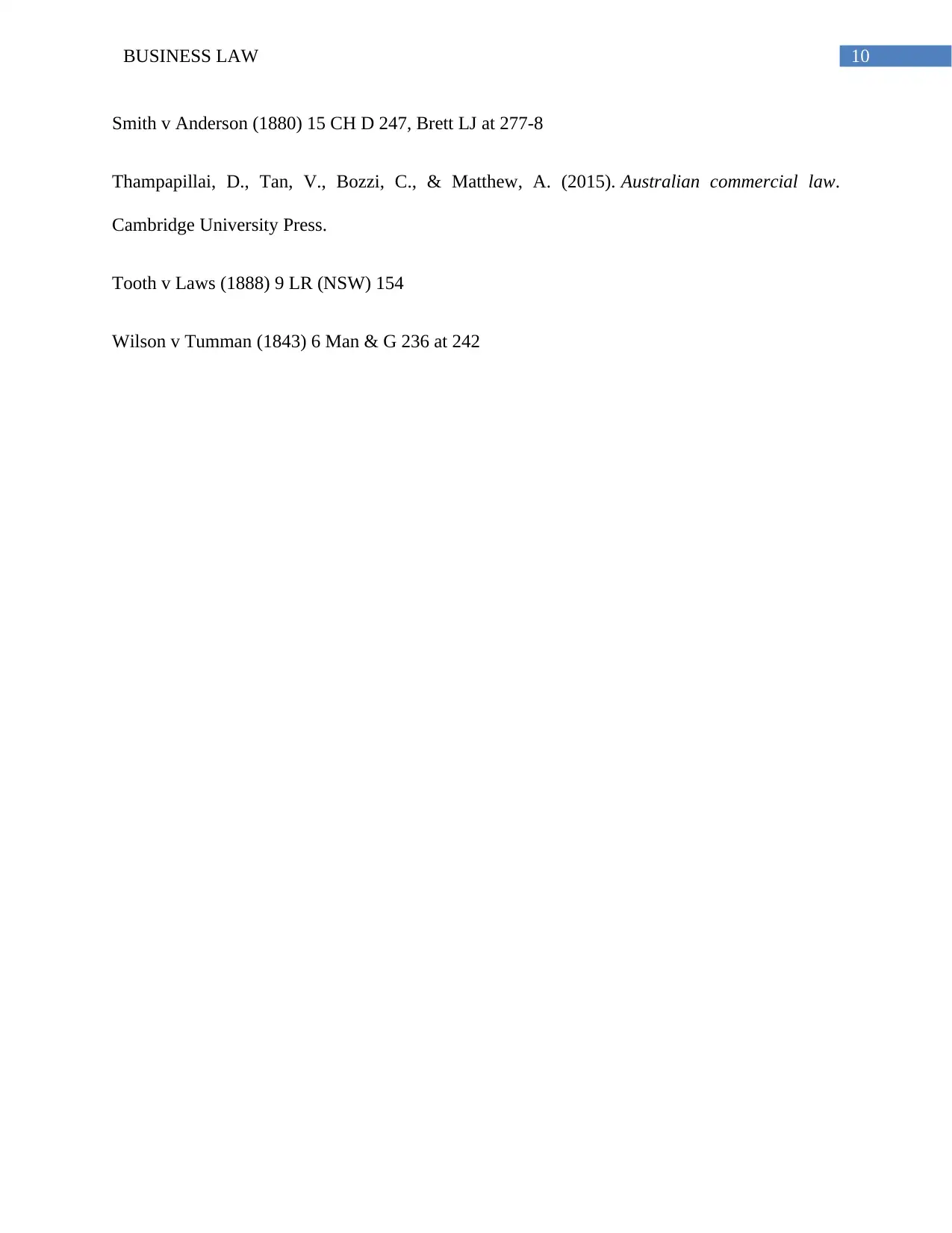
10BUSINESS LAW
Smith v Anderson (1880) 15 CH D 247, Brett LJ at 277-8
Thampapillai, D., Tan, V., Bozzi, C., & Matthew, A. (2015). Australian commercial law.
Cambridge University Press.
Tooth v Laws (1888) 9 LR (NSW) 154
Wilson v Tumman (1843) 6 Man & G 236 at 242
Smith v Anderson (1880) 15 CH D 247, Brett LJ at 277-8
Thampapillai, D., Tan, V., Bozzi, C., & Matthew, A. (2015). Australian commercial law.
Cambridge University Press.
Tooth v Laws (1888) 9 LR (NSW) 154
Wilson v Tumman (1843) 6 Man & G 236 at 242
1 out of 11
Related Documents
Your All-in-One AI-Powered Toolkit for Academic Success.
+13062052269
info@desklib.com
Available 24*7 on WhatsApp / Email
![[object Object]](/_next/static/media/star-bottom.7253800d.svg)
Unlock your academic potential
Copyright © 2020–2026 A2Z Services. All Rights Reserved. Developed and managed by ZUCOL.





